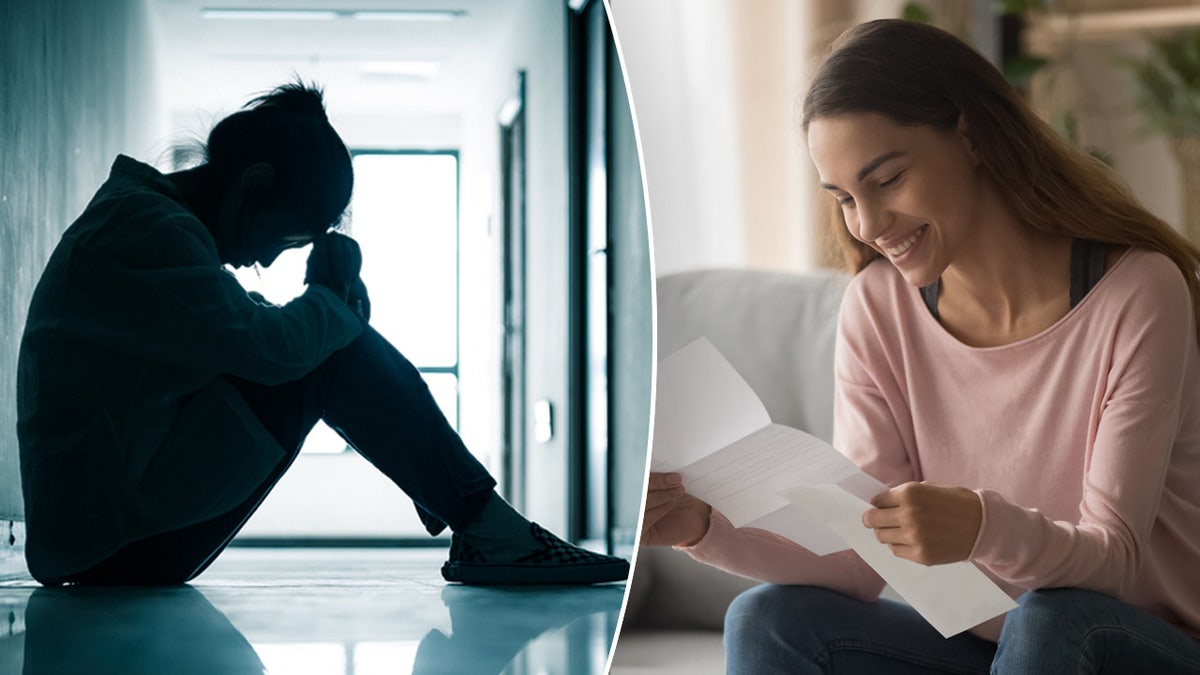Mental health of our youth is deteriorating: Dr. Yalda Safai
Psychiatrist Dr. Yalda Safai joins 'Fox News @ Night' to discuss the impact of social media pressures on America's youth and the strain of expectations to look flawless.
This story discusses suicide. If you or someone you know is having thoughts of suicide, please contact the Suicide & Crisis Lifeline at 988 or 1-800-273-TALK (8255).
A hospital in Nebraska that matches teenage suicide survivors with a "caring contact" says the program has seen positive results in preventing young patients from taking their own lives.
The first-of-its-kind program provides follow-up care in the form of handwritten, personalized notes from the hospital's social work staff after the teens are discharged.
The notes are sent one month, two months, three months, six months, nine months and one year after discharge — and the former patients are able to write notes back as well.
Sabrina Schalley, director of care coordination at Children's Nebraska, a pediatric hospital and medical center in Omaha, Nebraska, told Fox News Digital that Caring Contacts was inspired by a similar program for adult survivors of suicide.

Caring Contacts is an optional program at Children's Nebraska that connects teen suicide survivors with the social worker they met on the night of their attempt. The social worker sends personalized, encouraging notes throughout the year. (iStock)
In the fall of 2019, Schalley brought the idea of personalized follow-up care to the emergency department's social workers, "and they all liked the idea of the Caring Contacts."
The program was set to begin on May 1, 2020 — and that timing would turn out to be rather providential.
"We had no idea when we started that COVID was around the corner and the impact that would have on children's mental health," said Schalley.
"We quickly became so grateful for the intervention."
In the years since the COVID pandemic began, children and teens are experiencing depression and anxiety more than ever before, according to Schalley.
"Here at Children’s, our patients ages 11 and older are screening at risk of depression and/or suicide at nearly 30%," she said.
Each patient who receives a mental health assessment in the emergency department at Children's Nebraska is offered the chance to participate in Caring Contacts, said Schalley.
About 98% of families agree to join the program, she said.
"These are individuals who arrive due to suicide ideation or suicide gesture or who screen positive for suicide risk through the universal screening tool that all emergency department patients ages 11 and older receive," Schalley told Fox News Digital.
Parents or legal guardians then sign a release form, which allows social workers at the hospital to keep in contact with the patient over the next year.
Previously, teenage patients who attempted suicide received no further contact from Children's Nebraska after they were discharged from the emergency department, according to the hospital's website.

The first-of-its-kind program provides follow-up care in the form of handwritten, personalized notes from the hospital's social work staff after the teens are discharged from the hospital. (iStock)
There was "no opportunity for Children’s Hospital staff to provide ongoing encouragement and support for patients struggling with mental health needs," as stated on the site.
Nationally, about 27% of suicide survivors will make another attempt, said Schalley, but Children’s Nebraska’s numbers are now much lower.
"Thankfully, for the first three years of the program … 7% of enrolled patients are seen in a health care environment for a subsequent attempt," she told Fox News Digital.
TIKTOK TELEHEALTH? TEENS PUT AT RISK BY SELF-DIAGNOSING MENTAL HEALTH ON SOCIAL MEDIA
On a national level, anywhere from 31% to 55% of pediatric patients who are taken to the emergency department for a suicide attempt will receive some sort of follow-up within 30 days.
"One hundred percent of patients enrolled in Caring Contacts are receiving follow-up," noted Schalley.
"The program normalizes the struggles and challenges of mental health and stresses the importance of ongoing treatment."
Schalley credits the success of Caring Contacts to a multitude of factors, she told Fox News Digital.
"The program normalizes the struggles and challenges of mental health and stresses the importance of ongoing treatment," she said. "It provides positive coping skills and words of encouragement."
Plus, the program "provides the ability for the youth to maintain a positive, trusting relationship with the social worker," said Schalley.
TEEN GIRLS DEALING WITH MENTAL HEALTH CRISIS NEED ‘CONNECTION’ MOST, DOCTORS SAY
Unexpected beneficiaries of the Caring Contacts program are the staff members who write the cards.
Participating in Caring Contacts has "provided [staff] with an avenue to receive responses from the youth regarding updates on how they have progressed and hear feedback on their experience from the initial encounter," said Schalley.

The Caring Contacts program allows families to opt-in for year-long contact with the social worker their child met (not pictured) after a suicide attempt or suicide ideation. (iStock)
Mackenzie Parks, a licensed clinical social worker at Children's Nebraska, said the families she encountered were "touched and flattered" that the hospital would offer follow-up support.
"The letters I’ve received in return are really telling about the impact the program has on their well-being and hope for the future," she told Fox News Digital.
"I also feel that it helps families know that we truly do care about them when we’re assessing them — not just because it’s our job, but because we really want them to be safe," Parks added.
Eva Doescher, a licensed clinical social worker in Nebraska, shared similar feedback on her past Caring Contacts experiences.
"Caring Contacts gives me a chance to slow down and learn from the powerful, short moments that I get to connect with patients and their families," she told Fox News Digital.
"I feel that it helps families know we truly do care about them when we’re assessing them – not just because it’s our job, but because we really want them to be safe."
"Caring Contacts helps me make meaning from every interaction I have with the kids and families — that’s my ‘why,’ and what keeps me going," added Doescher.
To Schalley's knowledge, Children's Nebraska is the first pediatric emergency department to implement a program like Caring Contacts; but she hopes it will not be the last.

Nationally, suicide survivors engage in a re-attempt at a rate of 27%. Those enrolled in Caring Contacts had a much lower rate, the hospital told Fox News Digital. (iStock)
"We have created a replication kit to provide other hospitals and organizations with information on how they can implement the program," she said, noting that Children's Nebraska has presented the Caring Contacts concept at conferences and received interest from other facilities.
CLICK HERE TO SIGN UP FOR OUR HEALTH NEWSLETTER
Schalley suspects that the "intentionality" and deliberately low-tech communication between social workers and teens is another reason the program has worked so well.
"It recognizes the impact of a child or adolescent telling their story to a stranger in an emergency room during a time of crisis," she said. "Before, it was unlikely that the patient would hear from that social worker again."
"In our high-tech world, written words from a caring adult stand out and make a difference."
Now, that same social worker will send personal notes to the patient for a year, "offering unconditional caring and support along the way of their mental health journey."

"The cards are tangible and many of the patients report hanging them up in their rooms, keeping them in their cars or backpacks, and reading them aloud to their friends or family," the director said. (iStock)
"The cards are tangible and many of the patients report hanging them up in their rooms, keeping them in their cars or backpacks, and reading them aloud to their friends or family," said Schalley.
The cards could also work to save lives, as "most kids who make a suicide attempt go from thought to action in 10 minutes or less," said Schalley.
CLICK HERE TO GET THE FOX NEWS APP
"Imagine the power of having a card to reread … telling you that you are worthy from someone you met once," she said. "That’s life-changing."
Schalley added, "In our high-tech world, written words from a caring adult stand out and make a difference."










































